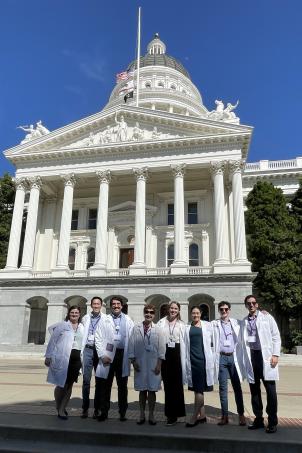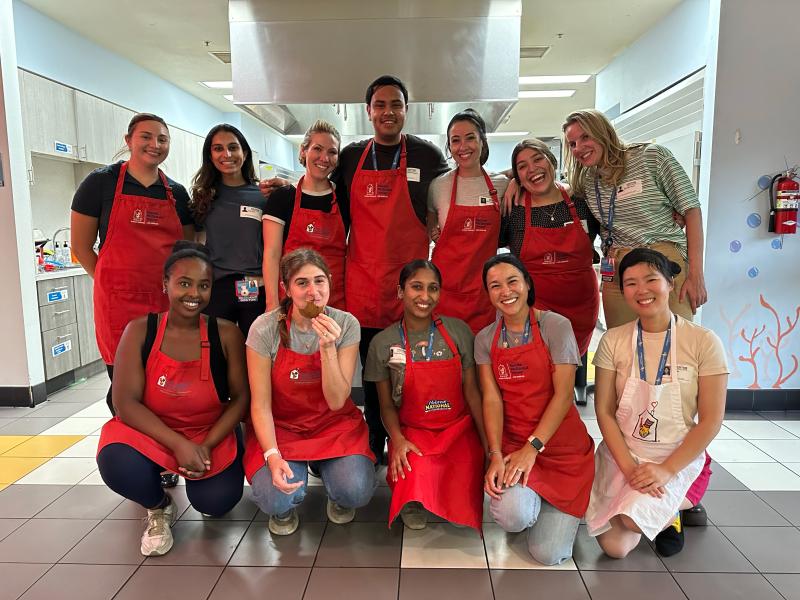Improving Medicine: Pediatricians and Communities Together (IMPACT) Program

The IMPACT program is designed for pediatric residents who are interested in gaining in-depth and focused experience involving either a community-based intervention or policy work. Participants have dedicated time during all three years of residency to work on developing and implementing a single project. Residents choose from one of three areas of emphasis: Community Health, Global Health, and Quality Improvement.
IMPACT Core Curriculum: IMPACT residents are required to attend a noon conference series separate from the general residency program, focused on child health advocacy, community health, research skills, and leadership. Examples of noon conference topics include:
- Child health policy and legislative advocacy
- Building community partnerships
- Project management skills
- Qualitative and quantitative research methods
- Health equity initiatives at CHLA
First Year
Interns participate in a two-week rotation together to learn collaboratively about foundational skills in project management, community partnerships, and research. They begin developing their project ideas, identifying mentors, and learning about the neighborhoods we serve through volunteer work and community visits.
In the spring, all interns participate in local legislative visits to advocate for state bills with the American Academy of Pediatrics. By the end of the year, interns are expected to submit an IRB proposal for their project and present their in-progress work at our annual poster day.

Second and Third Year
Residents spend a minimum of two weeks each year developing and implementing their project. With mentor support, they are encouraged to submit to local and national conferences and apply for internal or external grants. We continue to engage in volunteer work as a program to foster community.
At the end of the PGY3 year, residents collectively engage in an advocacy week in which they receive media training, including how to conduct on-camera interviews. They also travel to Sacramento as part of the AAP-California Legislative Leadership Conference to advocate for child health. Each PGY3 resident will also present a summary of their work during Grand Rounds for the hospital.
Scholarship
Our residents have been recognized through publications and presentations at local, national, and international conferences. Several projects have also received awards and grant funding. Examples of outstanding work:
- Lively-Endicott HR et al. Educator perspectives on grief-sensitive training during the COVID-19 pandemic in US public schools. Journal of School Health. 2024; 94(1): 5-13.
- Kow S, Rieger B et al. The positive impact of journaling on adolescents with cystic fibrosis. Pediatric Pulmonology. 2024; 59: 63-71.
- Brenner A, Rinaldi E, Woodstock E et. al. Where you live matters: Examining firearm injuries and Childhood Opportunity Index in LA County. Pediatric Academic Societies Meeting Oral Abstract. 2023.
- Panjwani S, Luciani K, Mallorga Hernandez A et al. Improving high-risk infant follow-up after neonatal intensive care unit discharge: A quality improvement initiative. Academic Pediatric Association Region IX/X Meeting Table-Top Discussion. 2024.
- Lehman J et al. Naloxone training and kit distribution. Recipient of 2024 CATCH Resident grant
Tracks
Community Health Track
The IMPACT Community Health Track equips residents with the skills to plan and implement community-based child health interventions, promoting a broader approach to improving children’s health beyond direct medical care. It focuses on fostering physician-community partnerships, education, urban planning, and policy change. The program’s goals include teaching trainees to navigate social and environmental factors, lead multidisciplinary teams, and understand community-based participatory research principles.
Global Health Track
The Global Health Track at CHLA is a three-year residency program designed to enhance residents’ understanding and skills in global health, recognizing that health issues cross geopolitical boundaries and are relevant to the diverse population in Los Angeles. This track provides training to deliver equitable healthcare, improve child health outcomes, and address health disparities, both locally and internationally. Residents participate in ethical and sustainable local-global and international projects, fostering personal and professional growth while expanding their expertise in pediatric health challenges. The program aims to integrate comprehensive global health education to shape residents’ careers and perspectives on healthcare delivery.
Quality Improvement Track
The Quality Improvement Track focuses on equipping physicians with the knowledge and tools to enhance healthcare systems and delivery. It emphasizes understanding and applying quality improvement theory and principles to implement effective, data-driven projects that improve efficiency, reduce errors, and optimize patient care. Participants learn to use biostatistical methods, run charts, and control charts for data analysis and develop the ability to assess and influence the healthcare system as a whole. This training is essential for maintaining Board Certification and aligns with professional standards set by the American Board of Medical Specialties and the Institute of Medicine.